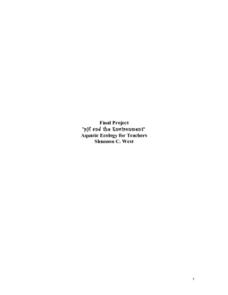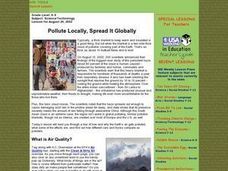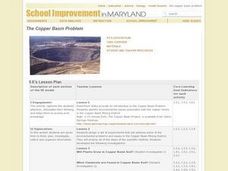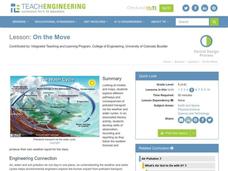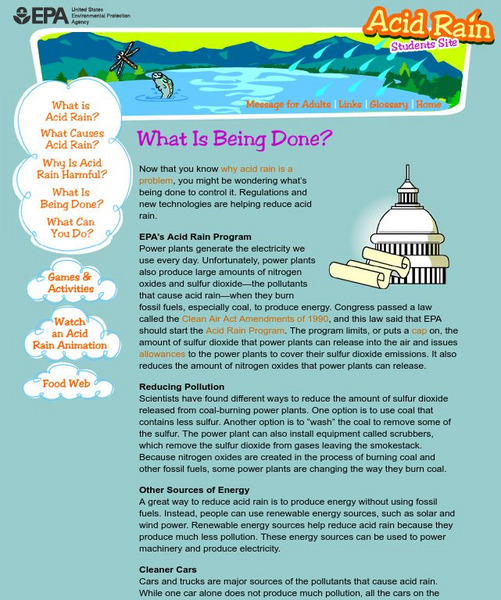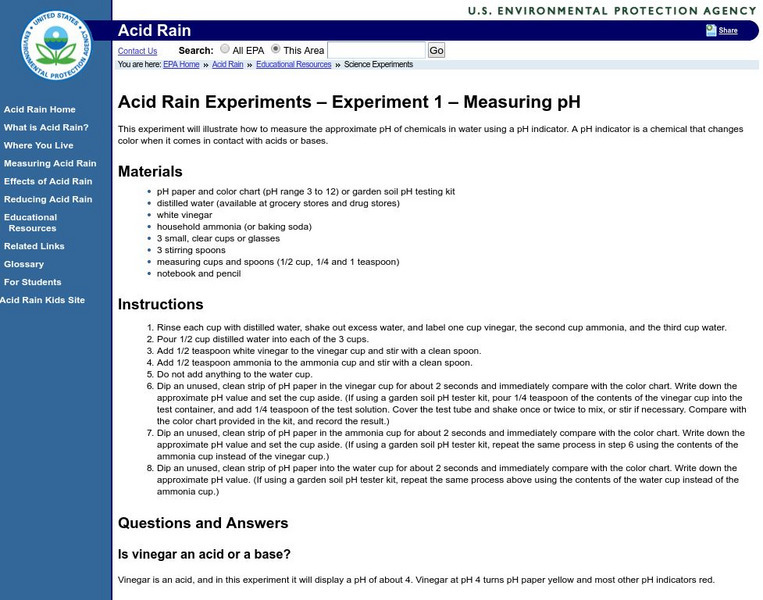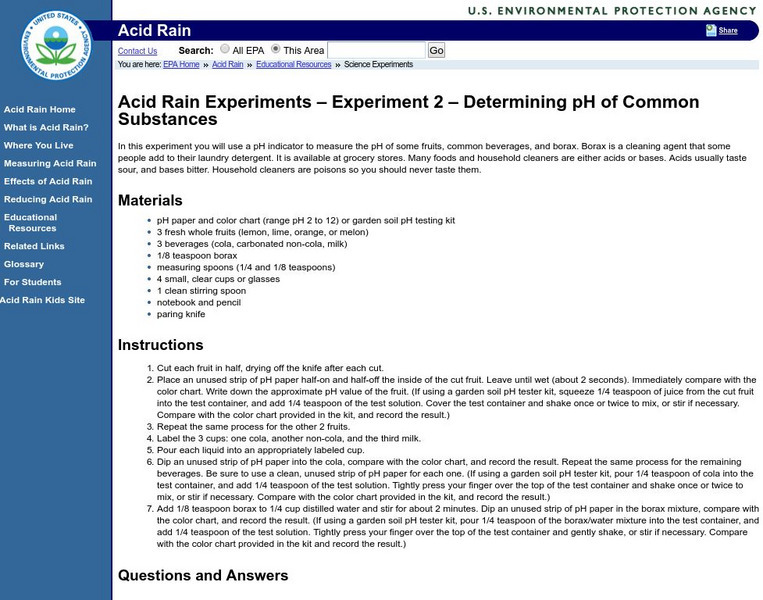NOAA
It All Runs Downhill
Examine how pollution makes its way into an ocean with help from a model watershed. Scholars use household items to recreate a mini-watershed, equipped with pollutants, that when mixed with rain drain into a model's body of water. After...
Curated OER
"pH and the Environment"
Eighth graders experiment and study about acids and bases by becoming involved in direct hands-on learning experiences and then relate those experiences to their own lives. They experience the Ohio River and what can be done to help...
Curated OER
Understanding pH, Alkalinity, and Hardness
High schoolers comprehend the interactions of pH, alkalinity, hardness, and carbon dioxide in aquaculture water. They read the SRAC fact sheet number 464 "Interactions of pH, Carbon Dioxide, Alkalintiy and Hardness in Fish Ponds." ...
Curated OER
Partnership in Science Education
Students compare two regions of the world, their own and one many miles away. They explore and compare these two places and prepare a report that gives a complete comparison and description of the two regions. They collaborate in...
Curated OER
Celebrate The Four Seasons
Students investigate cause and effect and compare and contrast how recurring cycles are evident in multiple aspects of their education. They answer questions in the chosen field. Students model each aspect by interpreting, perceiving and...
Curated OER
Rock River Watershed
Middle schoolers discover what a watershed is and which one they live in. Using the internet, they research why watersheds are important to an ecosystem and how to keep them from getting polluted. They use a map to locate various items...
Curated OER
The Air We Have Around Us
Students listen to story, The Lorax, by Dr. Seuss, discuss air quality and how people affect the earth and its atmospheric cycles, and give oral reports on what they have learned.
Curated OER
Calculating Your Foodometer
Students explore environmental issues by completing a food production class activity. In this carbon footprint lesson, students discuss the types of foods they eat, where they come from and what types of methods are used to transport...
Curated OER
The Earth is a Changin'
Learners view examples of different types of erosion. In this erosion lesson plan, students discuss the different types of erosion and how erosion changes Earth. Learners explore erosion and the effect it has on engineering.
Curated OER
Regolith Formation
Students compare and contrast the process of regolith formations. In groups, students define regolith and discover how regolith is formed on the Earth and on the Moon. They participate in experimental activities to simulate regolith.
Curated OER
Calculate Your Contribution
Young scholars assess the environmental impact of their transportation choices. They keep a transportation journal and use a website to calculate vehicle emissions for themselves and their class. They evaluate their transportation choices.
Curated OER
Global Warming Statistics
Students research real-time and historic temperature data of U.S. and world locations, and analyze the data using mean, median, and mode averages. They graph the data and draw conclusions by analyzing the data. A spreadsheet is used to...
Curated OER
Pollute Locally, Spread It Globally
Students examine the rate of pollution throughout the world through an interactive program. They define air quality and the air quality index. They examine fuel economy and its impact on the Earth and renewable and nonrenewable resources.
Curated OER
The Copper Basin Problem
Learners view a video about how human actions impact the environment. They design a set of experiments to address some of the problems and issues raised by the video.
Curated OER
pH
Learners use a Colorimetric test to measure pH and gain the importance to life in an aquatic ecosystem pH is. They explore the dramatic effect pH level can have on a water body. Students test the pH level of many water samples.
Curated OER
On the Move
Students explore different pathways and consequences of pollutant transport via the weather and water cycles. They observe and record weather information and produce their own weather report for the class.
Curated OER
What's Hiding in the Air?
Fifth graders conduct experiments to study the effects of invisible air pollutants including one with a bean plant. They examine methods of invisible air pollutants.
Curated OER
No magic borders
Students discuss what they have heard about pollution. They explore the purposes and limitations of political boundaries and borders and identify some of the causes and effects of pollution.
US Environmental Protection Agency
Epa: Acid Rain
Explore more about acid rain. This is an online experiment to observe "The influence of acid rain on plant growth." Find out how acid rain can damage your plants directly and indirectly.
Texas Instruments
Texas Instruments: Acid Rain
Students use the pH sensor to measure changes in the pH when CO2 dissolves in water. They also study the changes in the pH when sulphuric acid is added to water and identify water bodies most likely to be affected by acid rain.
Texas Instruments
Texas Instruments: Glencoe Mid. School Science: Effect of Acid Rain on Limestone
Students will collect rainwater and measure its acidity. They will use the rainwater to determine the effect that acid rain has on limestone.
US Environmental Protection Agency
Epa: Acid Rain: What Is Being Done?
The EPA discusses the actions the government agencies are taking to reduce acid rain.
US Environmental Protection Agency
Epa: Measuring P H Experiment
This is an activity that deals with acid rain. "This experiment will illustrate how to measure the approximate pH of chemicals in water using a pH indicator." It is easy to follow the comprehensive set of directions.
US Environmental Protection Agency
Epa: Determining the P H of Common Substances
In this acid rain experiment the students will be "determining the pH of common substances." This is a great lesson plan for an experiment.



